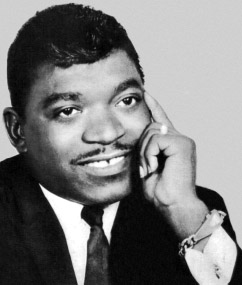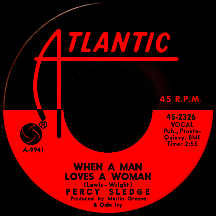PERCY SLEDGE
Oh, the heartbreak. His girl had left to pursue her dreams of a modeling career in another city, essentially starting a new life without him. 25-year-old Percy Sledge channeled his loss into a song, not so much as an artistic choice but to let out his frustrations in front of a small audience. During a performance at a Florence, Alabama club with The Esquires Combo, he motioned to organist Andrew Wright and bassist Calvin Lewis to improvise a slow blues rhythm, then began to wail, repeating the phrase "Why did you leave me, baby?" (the song's likely title). Knowing the situation with his gone-for-good girlfriend was hopeless, he simply wallowed in his pain, onstage, for several minutes. Thus began the process of creating "When a Man Loves a Woman," the career-defining hit that gained him fans across the globe.
Percy was a regular guy from Leighton, Alabama (its population less than a thousand when he was born in 1940) and singing had always come easy to him. As a child he sang in church on Sundays with his brother and sister and listened to local radio stations that mostly played country music. As a result, his musical heroes included Hank Williams and, later, Elvis Presley. While still in his teens, he took a wife and began raising a child, supporting them by taking a variety of jobs, working in fields or factories while dreaming of becoming a baseball player, a sport he'd played in high school and considered himself pretty good at. Moving about twelve miles away to Sheffield, a town near Muscle Shoals along the winding Tennessee River, he landed a job as an orderly at the Colbert County Hospital, often singing during his shifts, charming patients and co-workers alike. During this time, in the early '60s, he began performing locally with the Esquires, landing steady engagements at Florence State College a few miles away on the north side of the river.
Mississippian Quin Ivy, a record producer and disc jockey with experience at stations in Memphis and Muscle Shoals, had opened the Tune Town record store in Sheffield by 1962 when he and Rick Hall of the nearby FAME recording studio composed "I'm Qualified," the first single by Percy's cousin, Jimmy Hughes (also from Leighton); they teamed again on "Steal Away" by Hughes, the first major hit on Hall's FAME label in the fall of '64. The following year, with singers and musicians flocking to the Muscle Shoals area, Ivy opened Norala Sound, a small studio in Sheffield, with singer Marlin Greene, who'd made records between '57 and '63 including rocking singles for RCA Victor ("Marlene," "Never Been Kissed") and several teen-style efforts on Tune (a local Florence label), United Artists, Delta and Philips. When word got out about Sledge and his group, Quin approached them about recording at the studio.
Though Percy had no real songwriting experience, he'd been working on the lyrics of his 'Why did you leave me' song; a little self-doubt here, some anguish there, and it began taking shape with the melody Lewis and Wright had improvised. One line he'd come up with ('When a man loves a woman, can't keep his mind on nothin' else...') was the clincher that supplied the new title. In February 1966, Percy entered a studio for the first time, nervously recording the song at Norala with Greene and Ivy producing. In place of his Esquires bandmates, the musical backing was provided by several FAME regulars including organist Spooner Oldham, bassist Albert "Junior" Lowe, drummer Roger Hawkins and Marlin Greene on guitar with a horn section dubbed in later. Sledge hadn't figured his song would one day be considered a classic; lines like 'He'd give up all his comforts and sleep out in the rain...if she said that's the way it ought to be...' would soon resonate with millions of listeners.
Ivy took the master to Hall, who contacted Jerry Wexler at Atlantic Records. Jerry flipped out, certain it was a hit; a contract was signed, a B side ("Love Me Like You Mean It") was recorded in Sheffield and the single went out to radio stations and record stores in March. It was number one on the national pop and R&B charts by the end of May. Almost immediately, two female versions of the song appeared: "When a Woman Loves a Man" by Esther Phillips, also on Atlantic, charted in June and the other, by Ketty Lester, came out on the Tower label. Sledge, astounded by the sudden success, was awarded an RIAA gold record for a million in sales in July. He was nominated for two Grammy awards, Best Rhythm and Blues Recording and Best Rhythm and Blues Solo Vocal Performance, another NARAS oddity as both categories had the same five nominees (Percy, James Brown for "It's a Man's Man's Man's World," Lou Rawls for"Love is a Hurtin' Thing," Stevie Wonder for "Uptight (Everything's Alright)" and Ray Charles, who doubled up on the win with "Crying Time").
But there was one little error in judgment that Percy ultimately regretted: he gave all the songwriting credit for "When a Man Loves a Woman" to bandmates Lewis and Wright, who didn't even perform on the finished recording, nor did they write any other songs that anyone knows about. Percy's kindness, or carelessness - let's call it a lapse in judgment - cost him dearly in the long run, millions of dollars, perhaps, as many artists remade his great song throughout the years, some of them (Bette Midler, Jack Grayson, Michael Bolton and others) even scoring big hits with it. Good thing it wasn't Percy's only hit!

The FAME studio in Muscle Shoals became the destination of some of the music industry's hottest soul stars including Wilson Pickett, Aretha Franklin and Etta James, later branching out to include The Osmonds' biggest hits, Paul Anka's mid-'70s smashes and more latter-day country acts than you can shake a stick at. Meanwhile, Quin Ivy started his own Quinvy label, staying busy for several years while he and Greene continued producing Percy's hit output for Atlantic. The "mournfully sincere ballad" formula went unchanged for quite some time as the Sledge sound connected to a large fan base. By year's end, "Warm and Tender Love," penned by Fire/Fury founder Bobby Robinson, and the gut-wrenchingly effective Dan Penn-Spooner Oldham tune "It Tears Me Up" ('...I feel like I'm dyin'!') both reached the R&B top ten and pop top 20. Well-received 1967 efforts, many with a gospel feel, include Bobby Womack's "Baby, Help Me," Penn and Oldham's "Out of Left Field" and even a heartfelt rendition of the Elvis Presley-Vera Matson classic "Love Me Tender," which returned him to the top 40.
"Cover Me," written by Greene and session guitarist Eddie Hinton, took Sledge into '68, paving the way for his hottest seller since the '66 breakthrough smash. "Take Time to Know Her," a cautionary tale about carefully choosing a mate by country songwriter Steve Davis, became Percy's fourth top ten R&B hit and just missed the mainstream top ten. His string of popular singles continued through the end of the decade; highlights were Bobby Russell's "Sudden Stop," Joe Simon's "My Special Prayer," "Any Day Now" (the Bob Hilliard-Burt Bacharach song Elvis recorded in Memphis at about the same time) and a Buffalo Springfield favorite, "Kind Woman." After leaving Atlantic in 1974, Percy signed with Capricorn Records. "I'll Be Your Everything," a romantic ballad produced by Ivy, remained consistent with his established style and made a brief showing on the charts near the end of the year. His primary income at that time came from touring, particularly in European countries; several 1983 recordings for Monument Records strayed little from his comfort zone.
In 1987, a U.K. commercial for Levi's Jeans featured "When a Man Loves a Woman" and the song rose to prominence once again, reaching number two in Britain early in the year, besting its original top ten ranking there. An appearance on Saturday Night Live came immediately afterwards as he capitalized on the revival of his greatest recording. In 1995 he received a third Grammy nomination, in the category Contemparary Blues Album, for Blue Night, his vocal quality as strong as it had been nearly three decades earlier. Percy Sledge left us in 2015, but his vocal accomplishments aren't likely to be forgotten anytime soon. In recent years, his hometown of Leighton, Alabama has held its own music festival, Sledge Fest, featuring his son, Howell Sledge, performing with The Muscle Shoals Horns.
NOTABLE SINGLES:
- When a Man Loves a Woman - 1966
- Warm and Tender Love - 1966
- It Tears Me Up - 1966
- Baby, Help Me - 1967
- Out of Left Field - 1967
- Love Me Tender /
What Am I Living For - 1967 - Just Out of Reach (Of My Two Empty Arms) - 1967
- Cover Me - 1967
- Take Time to Know Her - 1968
- Sudden Stop - 1968
- You're All Around Me - 1968
- My Special Prayer - 1969
- Any Day Now /
The Angels Listened In - 1969 - Kind Woman - 1969
- True Love Travels on a Gravel Road - 1969
- Too Many Rivers to Cross - 1970
- Come Softly to Me - 1970
- Sunshine - 1973
- I'll Be Your Everything - 1974



